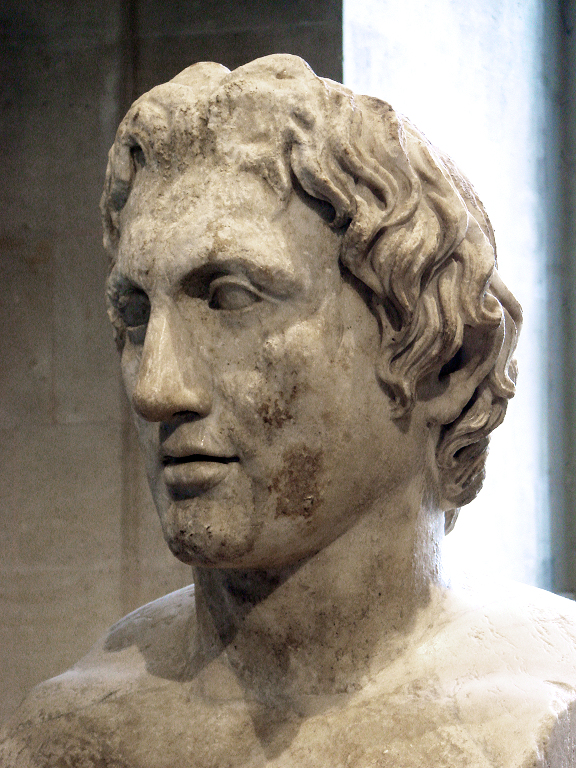Alexander III of Macedon Conquers Egypt... and Stays There?
 |
| Head Statue of Alexander III of Macedon, made by Lysippus, a sculptor who was hired by him Source: Louvre Museum |
Sixty-four years later in 336 B.C., the son of Philip II of Macedon, Alexander III, becomes the next Basileus (King) of Macedon. He fights against the Achaemenid (Persian) Empire two years later and is continuously victorious during his military campaign. Throughout all the lands he conquered, Alexander introduced the ideas of Greek civilization to the native population. The result was that Persian culture combined with major elements of Greek culture, a process known as Hellenization. Until his death in 323 B.C., Alexander's empire extended from the Adriatic Sea between modern-day Italy and Albania to the Beas River in modern-day India. It would eventually be carved up into smaller kingdoms by his generals.
 |
| Source: Generic Mapping Tools, Wikipedia |
In Lion's Blood, Mr. Barnes posits that he lost a leg during one of his battles and decided to stay in Egypt, which was at that time part of the Persian Empire. Similar to real-life, Alexander is declared to be Pharaoh of Egypt and given a new name: Haaibre Setepenamen (“Jubilant is the heart of Re, Chosen of Amen” ). It is in Egypt that he begins to start his own family by marrying a bride from the region.
What an interesting turn of events! Now, I would like to address some historical details and compare them to those in Lion's Blood.
What an interesting turn of events! Now, I would like to address some historical details and compare them to those in Lion's Blood.
The first thing I would like to say is that this second point of divergence, whose connection to Socrates' flight from Athens is inconsequential, is a far more plausible event than the first POD. Alexander's plans of conquest due to a significant injury being changed is a clever and creative way for him to establish a powerful empire that is not based in the Middle East, but in Africa. However, if I remember correctly, neither the defunct website nor the book ever mentions whether or not Alexander eventually succeeded in completely conquering the Persian Empire. Speaking of the website, Mr. Barnes made some chronological errors in his timeline. All of this was supposed to have occurred between 390 B.C. and 370 B.C., instead of between the years 336-332 B.C. The former years were during a time before Alexander was even born!
Second, the book never states where Alexander was injured, but it's plausible that it may have occurred either during the Siege of Tyre or Siege of Gaza, both of which occurred in 332 B.C. However, it could also be argued that his injury may have happened after conquering Persia. How unfortunate that it is never clarified how large Alexander's Empire was when he decided to stay in Egypt! According to the Anabasis of Alexander and the Bibliotheca historica, Alexander had plans to to conquer the Arabian peninsula and the surrounding lands of the Mediterranean Sea (Carthage, the island of Sicily, the straight of Gibraltar ["The Pillars of Heracles"]), respectively. The back cover of the Hardback edition of Lion's Blood mentions the existence of Carthage, which indicates that perhaps Alexander did not conquer it.
Third, I would like to talk about are Alexander's titles. While Mr. Barnes appears to have included some variation of his Egyptian title, his real-life multiple titles in Egypt (besides Pharaoh of Egypt) were the following:
Setepenre meryamun
[Chosen by Ra, beloved by Amun]
Mekemet
[Protector of Egypt]
Mai werpehty itj dju tau khasut
[The lion, great of might, who takes possession of mountains, lands, and deserts]
Alexander would already have his titles as Basileus of Macedon and Hegemon of the Hellenic League. I wonder if he would have gained additional titles, such as Lord of Africa, instead of Asia, and Shahansha of Persia if he had conquered it.
Despite some inaccuracies, I admire this POD more than the one involving Socrates. It makes the idea of an African civilization developing a powerful empire and eventually having the capacity to conquer the Americas way more plausible. The only significant flaw I see in this event is why would Alexander want to focus on Africa instead of the Persian Empire, even if he was injured. To my knowledge, he made no plans to explore Africa besides the coastal regions in the northern part of the continent. Perhaps the Sahara Desert was not worth exploring, if he knew about it at all. It's a curious idea to imagine how a Hellenized version of Africa beyond Egypt would look like. At this point of the alternate history, the reader might ask about Rome and how it would deal with the continued existence of Alexander's Empire and Carthage?
Let's find out...
Comments
Post a Comment